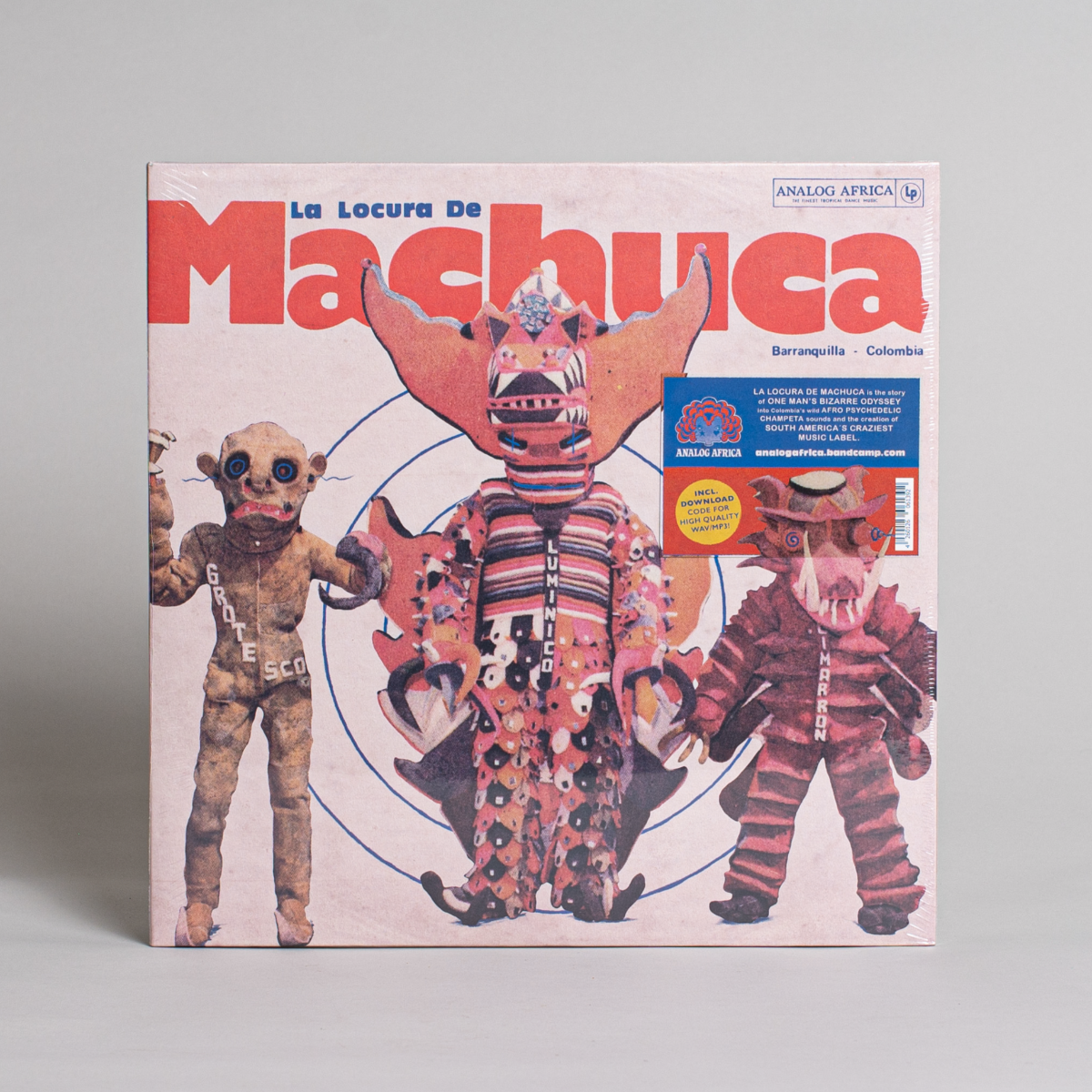Analog Africa - La Locura de Machuca
16. Oktober 2020
Various Artists
La Locura de Machuca 1975–1980
A captivating sonic journey, La Locura de Machuca 1975–1980 delves into the experimental Afro-Colombian
music scene of the late 1970s. This compilation, curated by Analog Africa, showcases 17 tracks from the
Discos Machuca label, founded by tax lawyer Rafael Machuca after a transformative experience in Barranquilla's
music scene. The album features a fusion of champeta, cumbia, and psychedelic sounds, reflecting the
vibrant and unconventional spirit of Colombia's coastal music underground during that era.
***
Eine fesselnde Klangreise: La Locura de Machuca 1975–1980 taucht ein in die experimentelle afro-kolumbianische
Musikszene der späten 1970er Jahre. Diese von Analog Africa kuratierte Compilation präsentiert 17 Titel des
Labels Discos Machuca, das vom Steueranwalt Rafael Machuca nach einem prägenden Erlebnis in der Musikszene
Barranquillas gegründet wurde. Das Album vereint Champeta, Cumbia und psychedelische Klänge und spiegelt den
lebendigen und unkonventionellen Geist der Küstenmusik Kolumbiens jener Zeit wider.
Tracklist:
Samba Negra – Eberebijara
King Somalie – Monkey's Dance
El Grupo Folclórico – Tamba
Los Viajeros Siderales – El Campanero
Rio Latino – Ayu
Aníbal Velásquez – La Mazamorra Del Diablo
La Francachela – Mosquita Muerta
El Grupo Folclórico – Juipiti
King Somalie – Le Mongui
El Grupo Folclórico – El Tornillito
Samba Negra – Long Life Africa
La Banda Africana – Te Clavo La... Mano
Myrian Makenwa – El Platano
El Grupo Folclórico – Tucutru
Grupo Bola Roja – Caracol
El Grupo D'Abelard – A Otro Perro Con Ese Hueso
Conjunto Barbacoa – Wabali
Analog Afrika
(EN) For a decade now, Samy Ben Redjeb’s seminal Analog Africa label has been unearthing the best in both explosive foot-shufflers and hypnotic sauntering treasures from Africa. It’s achieved more than most in celebrating the rich and diverse heritage of a much misunderstood and overlooked continent. Samy has spared nothing in his pursuit of choosing authentic and eye-opening choice records. His lifestyle and string of various jobs—from a Life Aquatic sojourn as a diving instructor in Senegal to a stint as a Lufthansa flight attendant crisscrossing the Lagos-Addis Ababa-Accra arc and beyond—have all been centered on a passion for crate digging.
Samy Ben Redjeb at his home in Frankfurt (Germany)
Samy’s inaugural kickstart happened in Dakar, where he first set up a makeshift club night at a hotel. He played an abundance of previously forgotten polyrhythm hotsteppers and dancefloor-beckoning Afro R&B howlers before embarking on the countless misadventures that would define and bear fruit as the Analog Africa record label. Starting with the sun-ripened lilt and cantering Green Arrows of Zimbabwe in 2006, and honing in on the key era of the late 1960s to early 1980s, Samy reintroduced his audience to the raw psychedelic sounds of Benin and Togo: from the now iconic African Scream Contest to the self-coined “Islamic funk belt” and heaventilting horn sections of Ghana on Afro-Beat Airways to the ethereal mystery of landlocked Burkina Faso with Bambara Mystic Soul, and the salacious accordion and Ferro-scrapped dynamism of Cape Verde’s infectious and previously banned Funaná, appearing on the reissue of the legendary archipelagos export Bitori Nha Bibinha. The story of African music, with its long-forgotten footnotes and often ignored links, has also enjoyed enlightening reappraisals—such as the Congolese maestro of electric guitar, Georges Mateta Kiamuangana, otherwise known as Verckys (anointed as “Mister Dynamite” by an astonished James Brown after watching him perform) and the mightiest funk ensemble in all of Africa, the Orchestra Poly-Rythmo de Cotonou.
By dusting off rare finds, locating those responsible, and in many cases interviewing the principle team or artist behind these iconic recordings, the allencompassing journey from transforming the source material into a sumptuous (and on occasion award-winning) objet d’art is documented for posterity.
(DE) Seit einem Jahrzehnt fördert Samy Ben Redjebs bahnbrechendes Label Analog Africa das Beste aus Afrika zutage - sowohl explosive Fußgänger als auch hypnotisch schlendernde Schätze. Es hat mehr als die meisten anderen erreicht, das reiche und vielfältige Erbe eines oft missverstandenen und übersehenen Kontinents zu feiern. Samy hat nichts gescheut, um authentische und augenöffnende Platten auszuwählen. Sein Lebensstil und seine verschiedenen Jobs - von einem Life-Aquatic-Aufenthalt als Tauchlehrer im Senegal bis hin zu einem Einsatz als Flugbegleiter bei der Lufthansa, der den Bogen von Lagos nach Addis Abeba und Accra und darüber hinaus überspannt hat - sind alle von seiner Leidenschaft für das Kistenwühlen geprägt.
Samy Ben Redjeb in seinem Haus in Frankfurt (Deutschland)
Samys erster Kickstart fand in Dakar statt, wo er zunächst eine behelfsmäßige Clubnacht in einem Hotel einrichtete. Er spielte eine Fülle von bereits vergessenen Polyrhythmus-Hotsteppern und Dancefloor-beachtenden Afro-R&B-Heulern, bevor er sich auf die zahllosen Missgeschicke einließ, die das Analog Africa Plattenlabel definieren und Früchte tragen sollten. Angefangen mit dem sonnengereiften Lilt und den galoppierenden Green Arrows aus Simbabwe im Jahr 2006, hat Samy sein Publikum mit den rohen, psychedelischen Klängen aus Benin und Togo vertraut gemacht und sich auf die Ära der späten 1960er bis frühen 1980er Jahre konzentriert: Vom mittlerweile ikonischen African Scream Contest über den selbstgeprägten "islamischen Funkgürtel" und die heftig schleppenden Bläsersätze Ghanas auf Afro-Beat Airways bis hin zum ätherischen Mysterium des Binnenlandes Burkina Faso mit Bambara Mystic Soul und der anzüglichen Akkordeon- und Ferro-Scrap-Dynamik des ansteckenden und zuvor verbotenen Funaná der Kapverden, das auf der Neuauflage des legendären Archipel-Exports Bitori Nha Bibinha erscheint. Die Geschichte der afrikanischen Musik mit ihren lange vergessenen Fußnoten und oft ignorierten Verbindungen hat ebenfalls eine aufschlussreiche Aufarbeitung erfahren - wie der kongolesische Maestro der E-Gitarre, Georges Mateta Kiamuangana, auch bekannt als Verckys (von einem staunenden James Brown als "Mister Dynamite" bezeichnet, nachdem er ihn auftreten sah) und das mächtigste Funk-Ensemble in ganz Afrika, das Orchestra Poly-Rythmo de Cotonou.
Durch das Entstauben seltener Fundstücke, das Aufspüren der Verantwortlichen und in vielen Fällen durch Interviews mit dem Hauptteam oder dem Künstler hinter diesen ikonischen Aufnahmen wird die allumfassende Reise von der Umwandlung des Ausgangsmaterials in ein prächtiges (und gelegentlich preisgekröntes) Kunstobjekt für die Nachwelt dokumentiert.

